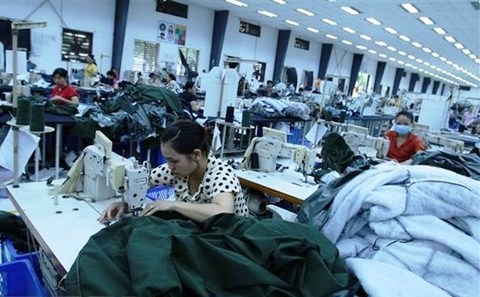 |
| A steel factory in Bà Rịa-Vũng Tàu Province. Vietnamese enterprises are closely watching the escalating US-China trade war and fear its possible impacts. |
On Friday China announced plans to impose additional duties on US$75 billion worth of American goods on September 1 and December 15.
US President Donald Trump tweeted the same day his administration would raise tariffs on $550 billion worth of Chinese imports.
The latest round of announcements means that by the end of the year essentially all Chinese goods exported to the US will be subject to duties.
Dinh Cong Khuong, director of Khuong Mai Steel JSC said that the HCM City Steel Business Club held its first “entrepreneurs' cafe” programme on Saturday to discuss opportunities and challenges faced by the industry this year, reported the Nguoi Lao Dong (The Labourer) newspaper.
Most steel companies are aware that as the trade war escalates, opportunities are less than challenges for them since they face a decrease in demand, he said.
Producers cannot reduce output since blast furnaces have to operate non-stop, but demand is slowing down globally, and competition is becoming intense, he said.
“If the trade war prolongs, it will affect Vietnamese enterprises."
Diep Thanh Kiet, vice chairman of the Viet Nam Leather and Footwear Association, said the US president’s order that US companies should immediately start looking for alternatives to China, including bringing their companies home, would have both positive and negative impacts on Viet Nam.
The Vietnamese footwear industry has a capacity of over one billion pairs of shoes a year and needs 10 years to double it.
Meanwhile, China exports 1.7 billion pairs annually to the US. If even half of this is shifted to Viet Nam, the industry could not manage it, he said.
"Viet Nam’s footwear industry exports 460 million pairs of shoes to the US annually, and if the exports suddenly surge, the risk of attracting anti-dumping tariffs is very large."
According to experts and businesses, Chinese businesses in other sectors such as garment and textile, seafood and electronics too want to switch their production to Viet Nam to avoid the impacts of the trade war.
The shift poses challenges to Vietnamese firms who would face fierce competition from the Chinese in many areas, from getting human resources and land to prices, they warned.
Dr Tran Dinh Thien, a member of the National Monetary and Financial Policy Advisory Council, said the trade war had caused negative effects on the trade, investment and monetary policies of many countries, including Viet Nam.
This requires the Government and businesses to forecast the long-term negative impacts to come up with appropriate measures, he said.
Tran Du Lich, member of the Economic Advisory Group to the Prime Minister, said the US President’s order to US companies to immediately start looking for an alternative to China would offer Viet Nam the opportunity to attract investment from the US.
But for that, the country needs to further reform its institutions, he added. — VNS
 Many Vietnamese enterprises are keeping a close eye on the escalating US-China trade war and have said the challenges from it outnumber the opportunities for them.
Many Vietnamese enterprises are keeping a close eye on the escalating US-China trade war and have said the challenges from it outnumber the opportunities for them.